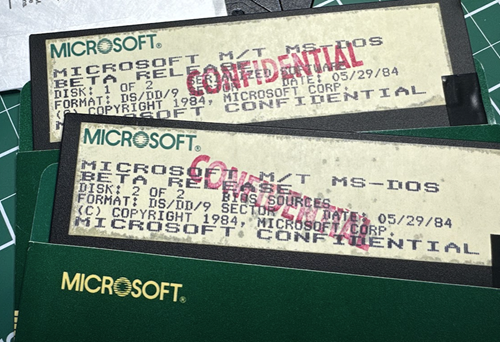Open Sourcing DOS 4
 See the canonical version of this blog post at the Microsoft Open Source Blog!
See the canonical version of this blog post at the Microsoft Open Source Blog!
Ten years ago, Microsoft released the source for MS-DOS 1.25 and 2.0 to the Computer History Museum, and then later republished them for reference purposes. This code holds an important place in history and is a fascinating read of an operating system that was written entirely in 8086 assembly code nearly 45 years ago.
Today, in partnership with IBM and in the spirit of open innovation, we're releasing the source code to MS-DOS 4.00 under the MIT license. There's a somewhat complex and fascinating history behind the 4.0 versions of DOS, as Microsoft partnered with IBM for portions of the code but also created a branch of DOS called Multitasking DOS that did not see a wide release.
https://github.com/microsoft/MS-DOS
A young English researcher named Connor "Starfrost" Hyde recently corresponded with former Microsoft Chief Technical Officer Ray Ozzie about some of the software in his collection. Amongst the floppies, Ray found unreleased beta binaries of DOS 4.0 that he was sent while he was at Lotus. Starfrost reached out to the Microsoft Open Source Programs Office (OSPO) to explore releasing DOS 4 source, as he is working on documenting the relationship between DOS 4, MT-DOS, and what would eventually become OS/2. Some later versions of these Multitasking DOS binaries can be found around the internet, but these new Ozzie beta binaries appear to be much earlier, unreleased, and also include the ibmbio.com source.
Scott Hanselman, with the help of internet archivist and enthusiast Jeff Sponaugle, has imaged these original disks and carefully scanned the original printed documents from this "Ozzie Drop". Microsoft, along with our friends at IBM, think this is a fascinating piece of operating system history worth sharing.
Jeff Wilcox and OSPO went to the Microsoft Archives, and while they were unable to find the full source code for MT-DOS, they did find MS DOS 4.00, which we're releasing today, alongside these additional beta binaries, PDFs of the documentation, and disk images. We will continue to explore the archives and may update this release if more is discovered.
Thank you to Ray Ozzie, Starfrost, Jeff Sponaugle, Larry Osterman, our friends at the IBM OSPO, as well as the makers of such digital archeology software including, but not limited to Greaseweazle, Fluxengine, Aaru Data Preservation Suite, and the HxC Floppy Emulator. Above all, thank you to the original authors of this code, some of whom still work at Microsoft and IBM today!
If you'd like to run this software yourself and explore, we have successfully run it directly on an original IBM PC XT, a newer Pentium, and within the open source PCem and 86box emulators.
About Scott
Scott Hanselman is a former professor, former Chief Architect in finance, now speaker, consultant, father, diabetic, and Microsoft employee. He is a failed stand-up comic, a cornrower, and a book author.
About Newsletter
I hope we can eventually get DOS 5 released - this was the first of the modern DOS's (DOS 5, 6.x being very similar), well getting the last ones would be good, I guess the drivespace thing may complicate things from the 6 side though.
Sujit
https://techsujit.com
https://kaizen-apps.com
https://www.os2museum.com/wp/how-not-to-release-historic-source-code/
Read three times, maybe THEN you'll get it!
There is a small but still active OS/2 community that will benefit of that.
On the other side the education value of an open source hybrid kernel like OS/2 with an important API set is also interesting.
Regards
Since I may one day contribute to Dosbox, DosEmu or Wine if I were to look at unofficially released source for DOS or Windows then that could influence me and I could end up contributing code I don't have the rights to, and cause a legal mess for those projects.
I can look at the officially released code, and since DOS 4 is under MIT license, take that code and contribute it or things I find out by reading it to projects with compatible licenses.
While Arca Noae exploits that "OS/2 community" and produces
ArcaOS, OS/2 source will be never released.
Scott praises archiving community, yet itself fails even to preserve timestamps and in the end ruins source code too.
go back to school, "professor"
I had a quick look around on github - it is basically 100% assembler !
Everything, e.g. also edlin is implemented in assembler. I assumed (without thinking too much) I would find a lot of C code there.
Anyway, nice :-)
Having the sources for DR-DOS 6 and or Novell DOS 7 would be nice too :-)
Shame so many have to be negative about how git/linux handles MS-DOS text, it's like they've never had to convert text files before, or they are just in the rush to be first to declare their negativity to the world. :|
But rest assured some of us DO appreciate it, and are now even running it on their machines!
Enjoy the trip to Korea!
i've diffed the files - seem to be exact the files of the product installations: https://www.vogons.org/viewtopic.php?p=1257597#p1257597
экрана и редактора, в программе есть функция синтеза речи и рисования поверх видео.
You have some really great posts and I feel I would be a good asset.
If you ever want to take some of the load off, I'd
absolutely love to write some material for your blog in exchange for a link back to mine.
Please send me an email if interested. Regards!
Pretty sure I landed on your blog decade(s) ago, for the Ultimate Tools List :-)
Comments are closed.
